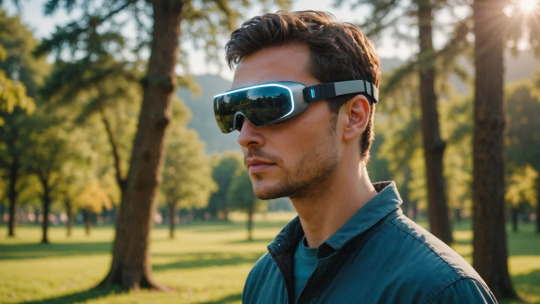#HandsFreeTech
Explore tagged Tumblr posts
Text
How AI Wearables are Redefining Our Relationship with Technology
Technology is advancing rapidly, and one of the most exciting areas of growth is wearable AI assistants. Devices like smart glasses and AI-powered wearables are no longer limited to fitness tracking. They now offer interactive features that could change our daily lives in remarkable ways. For instance, the Humane AI Pin and Rabbit R1 are leading the charge for hands-free, screenless users, signaling a potential future where smartphones might not be necessary.
The rapid rise of artificial intelligence is transforming our interactions with technology and opening doors for personal convenience, accessibility, and greater functionality.
The Shift from Conventional Wearables to AI-Powered Experiences
Wearable technology has typically focused on fitness monitoring and health tracking. Smartwatches and fitness trackers have been the go-to devices, measuring steps and heart rates while sending notifications. However, AI-powered wearables are changing the game.
Take the Humane AI Pin, which not only recognizes faces but also understands voices. This creates a highly personalized experience for users. Instead of merely sending alerts, this device allows a more natural interaction. A Gartner report predicts that the global wearable device market will jump from $116 billion in 2021 to nearly $205 billion by 2025, illustrating strong demand for these advanced technologies.
Similarly, the Rabbit R1 is built for voice-first interaction, eliminating screens altogether. Users can engage in natural conversations with their devices. Imagine asking your wearable for directions while walking rather than pulling out your phone.
The Rise of Hands-Free Technology
As technology becomes more embedded in our routines, the need for hands-free options is growing. Conventional smartphones can be distracting; users often find themselves looking at screens instead of their surroundings. AI wearables like the Humane AI Pin and Rabbit R1 address this problem effectively.
A survey by Pew Research Center shows that 68% of smartphone users feel distracted by their devices. AI wearables can help reduce this distraction. With voice recognition, users can send messages, set reminders, and even control smart home devices just by speaking. This hands-free interface makes it easier to focus on what matters while staying connected.
AI Personalization: Learning and Adapting
AI wearables can learn and adapt to individual behaviors, tailoring interactions for improved usability. For example, if you tend to request traffic updates every morning, your device can proactively provide that information. This not only saves time but improves planning as well. According to a study by McKinsey & Company, companies that use AI for personalization can see customer satisfaction rates increase by up to 20%.
AI wearables are active participants in daily life rather than simple tools. They adjust based on user input, allowing for a smoother experience and helping individuals navigate their environment more effectively.
Health and Wellness Reimagined
AI wearables are set to revolutionize how we approach health and wellness. Traditional fitness trackers mostly focus on exercise metrics, but AI can give more comprehensive insights.
For example, AI can assess sleep patterns and suggest lifestyle changes rather than simply tracking hours slept. Continuous monitoring and feedback help users make better choices. The World Health Organization reports that mental health issues impact more than 1 in 4 people globally. AI wearables can support mental wellness by offering meditation reminders, mood tracking, and personalized coping strategies, creating a more holistic approach to health.
Challenges and Concerns
Despite the benefits, there are challenges that must be addressed. Privacy and security are critical issues. As AI devices collect personal information, protecting this data is essential for user trust.
The Electronic Frontier Foundation cautions that sophisticated wearables could become intrusive. Users must understand what data is collected and how it is shared. Manufacturers must prioritize transparency and adhere to strong data protection regulations as technology becomes more integrated into our lives.

Another concern is the risk of becoming overly dependent on these devices. While wearables enhance our lives, finding a balance where they assist instead of control is important. Mindful usage will promote a healthier relationship with technology.
The Future of Wearable AI
The future of wearable AI is promising and intriguing. Experts believe we are nearing an era where wearables will become crucial to daily activities, similar to the role of smartphones today.
This change will stem from advancements in technology, broader applications, and the potential for improved communication. Numerous sectors, including healthcare and education, are beginning to see the value in AI wearables. Healthcare professionals might use them for real-time patient monitoring, while educators could integrate wearables into personalized learning plans.
As artificial intelligence progresses, the capabilities of wearables will expand. The emphasis will need to remain on enhancing user experience while ensuring trust in the technology.
Embracing the Future of AI Wearables
Wearable AI assistants are at the forefront of transforming how we interact with technology. Devices like the Humane AI Pin and Rabbit R1 offer innovative solutions that go beyond traditional usage, leading to hands-free experiences.

This shift brings numerous benefits, from health monitoring to tailored user experiences. However, we must also address concerns surrounding privacy, dependence, and ethical implications.
As wearable AI technology continues to evolve, we will need to navigate these advancements carefully. The goal is to ensure that technology enriches our lives while maintaining our well-being. We stand on the brink of a new chapter, one where our connection with technology is more intuitive, efficient, and rewarding.
#techinnovation#ai#artificialintelligence#machinelearning#SmartGlasses#AIInnovation#WearableTechnology#TechTrends#HumaneAIPin#RabbitR1#AIRevolution#HandsFreeTech#SmartDevices#DigitalTransformation#AICompanions#EmergingTech#TechForGood#Innovation#HealthTech#AIandPrivacy#FutureOfAI
0 notes